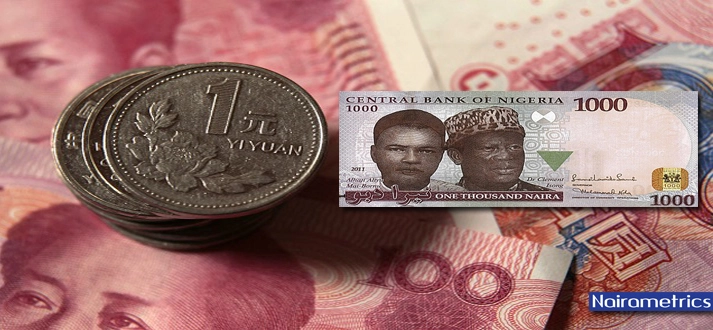
WITH Nigeria battling high inflation, the Chinese Yuan swap deal can be reactivated to fight the menace, experts have advised.
The three years deal was concluded on April 27, 2018, at a ceremony in China between Nigeria and the People’s Republic of China.
The swap deal was worth $2.4 billion and aimed at boosting ties and reducing the need to use dollars in bilateral trade.
Specifically, the currency swap agreement was to finance trade and investment between China and Nigeria, maintain financial market stability and facilitate other connected purposes as may be agreed upon by both countries.
It seeks to create a platform that provides naira to Chinese firms and investors looking to do business with Nigeria on the one hand and provides Chinese Yuan to Nigerian firms and investors looking to do business with China on the other hand.
Experts argued that such a deal could be arranged with countries that have huge trade volumes with Nigeria, saying such a deal would reduce the pressure on the dollar and, by extension, keep inflation in check.
Under the agreement, both the CBN and the PBoC were (subject to the maximum amount indicated under the Currency Swap Agreement) to make available liquidity in their respective currencies for the facilitation and promotion of trade and investments between the two countries through the purchase, sale and subsequent repurchase and resale of the Chinese Yuan against the Naira and vice versa.
Experts believe that despite the concerns raised, such deals are headed in the right direction. The reduction in dollar demand, expected to be achieved through the swap deals, will complement the CBN’s current intervention via the Investors’ and Exporters’ (I & E) FX Window in deepening stability in the market, by curbing the incidences of dollar scarcity and exchange rate volatility.
Also, such deals will be particularly favourable to Nigeria’s foreign reserves, which have been on a steady decline due partly to the unmitigated oil theft in the Niger Delta region.
The Chief Executive Officer at Dairy Hills Limited, Kelvin Ayebaefie Emmanuel, said: “The Central Bank of Nigeria needs to bifurcate its reserve management programme by sending 50 per cent of its reserves to the People’s Bank of China as a means to fund the $12.88 billion yearly imports without using the US dollar as a swap currency. This is in line with the Naira Yuan swap deal that was signed in April 2018 but failed because of a lack of liquidity to back settlements. This will reduce the pressure on the demand of form M for trade with China that currently has the largest share of bilateral trade with Nigeria.”
To tame inflation, he said, the Central Bank of Nigeria must end the quantitative easing (QE) programme that has raised the ways and means of lending above 10 per cent of GDP.
He also advocated a massive backward integration programme across key sectors where Nigeria has a comparative advantage.
In 2021, Nigeria spent N425 billion importing raw unfortified sugar, and produced only 41,500 metric tonnes, which is the lowest in a survey of production output to import ratio of five sub-Saharan African countries.
He submitted that implementing the sugar masterplan developed by the NSDC based on Cap 88 of LFN as amended in 2015, will enable Nigeria to produce in the four phases above 1.6m metric tonnes – current annual consumption – to becoming a net exporter, which is a key to saving $1 billion in imports of which Nigeria has $65 billion in annual imports from cars, to petroleum derivatives, etc.
He hinted that the falling Naira is caused by a negative current account balance, lack of liquidity from an exchange rate subsidy programme that does not provide a forward curve for manufacturers to either purchase raw materials or repatriate profits and shrinking of Foreign Direct Investments and Foreign Portfolio Investments that is due to lack of clarity in the ratio of external risk to the internal rate of return.
Nigeria depends on oil receipts for selling crude, remittances and NXP proceeds to meet the demand for the greenback.
Emmanuel revealed that Nigeria can escape the impending doom by focusing on designing a subsidy removal programme in four phases that will be implemented every six months as a means to save $9 billion and rising on scarce forex revenues under Direct Sale Direct Purchase (DSDP) for Premium Motor Spirit (PMS).
Nigeria should also remove the peg on rates by adopting a floating exchange rate mechanism as a means to converge the different rates in the markets and the Federal Government should call a meeting of the National Economic Council and call for a collapse of the Excess Crude Account into both the Consolidated Revenue Fund (based on sections 162 (1) of the LFN, and Sovereign Wealth Fund, as a means to raise the government’s revenue to GDP ratio and bring down the curve for debt servicing to govt revenues.
An Economist, Samuel Ajagun, said currency swap agreements could be significant in many respects.
He explained that such deals will allow trading between Nigeria and other countries to be done directly in their local currencies without any need for the dollar and enable local currencies to flow freely within the Nigerian banking system.
“This development will improve bilateral trade between Nigeria and those countries it signs such deals with and will have the capacity to engender foreign investment flows and economic cooperation beneficial to involved parties. The significant cut on dollar demand by firms and investors doing business across the involved countries will help protect their financial markets and boost their respective foreign reserves,” he said.
The experts were quick to point out that concerns remain as to the potency of the currency swap deal to fully address the challenge of high dollar demand, since Nigeria imports from many count








